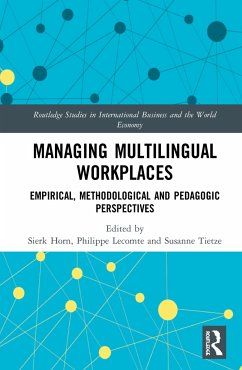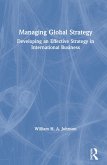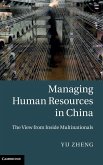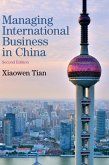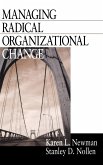Managing Multilingual Workplaces
Methodological, Empirical and Pedagogic Perspectives
Herausgeber: Horn, Sierk; Tietze, Susanne; Lecomte, Philippe
Managing Multilingual Workplaces
Methodological, Empirical and Pedagogic Perspectives
Herausgeber: Horn, Sierk; Tietze, Susanne; Lecomte, Philippe
- Gebundenes Buch
- Merkliste
- Auf die Merkliste
- Bewerten Bewerten
- Teilen
- Produkt teilen
- Produkterinnerung
- Produkterinnerung
This book provides a source that unites insights from multilingual empirical research, methodological considerations and pedagogic practice in order to advance knowledge and debate.
Andere Kunden interessierten sich auch für
![Managing Global Strategy Managing Global Strategy]() William H. A. JohnsonManaging Global Strategy195,99 €
William H. A. JohnsonManaging Global Strategy195,99 €![Transnational Organizations and Cross-Cultural Workplaces Transnational Organizations and Cross-Cultural Workplaces]() Yukimi ShimodaTransnational Organizations and Cross-Cultural Workplaces81,99 €
Yukimi ShimodaTransnational Organizations and Cross-Cultural Workplaces81,99 €![Managing Human Resources in China Managing Human Resources in China]() Yu ZhengManaging Human Resources in China95,99 €
Yu ZhengManaging Human Resources in China95,99 €![Managing Subsidiary Dynamics Managing Subsidiary Dynamics]() Managing Subsidiary Dynamics186,99 €
Managing Subsidiary Dynamics186,99 €![Managing International Business in China Managing International Business in China]() Xiaowen TianManaging International Business in China117,99 €
Xiaowen TianManaging International Business in China117,99 €![Language Tutoring for Everyone Unlocking Multilingual Potential Language Tutoring for Everyone Unlocking Multilingual Potential]() Rishi KapoorLanguage Tutoring for Everyone Unlocking Multilingual Potential25,99 €
Rishi KapoorLanguage Tutoring for Everyone Unlocking Multilingual Potential25,99 €![Managing Radical Organizational Change Managing Radical Organizational Change]() Karen L. NewmanManaging Radical Organizational Change158,99 €
Karen L. NewmanManaging Radical Organizational Change158,99 €-
-
-
This book provides a source that unites insights from multilingual empirical research, methodological considerations and pedagogic practice in order to advance knowledge and debate.
Hinweis: Dieser Artikel kann nur an eine deutsche Lieferadresse ausgeliefert werden.
Hinweis: Dieser Artikel kann nur an eine deutsche Lieferadresse ausgeliefert werden.
Produktdetails
- Produktdetails
- Verlag: Routledge
- Seitenzahl: 266
- Erscheinungstermin: 4. August 2020
- Englisch
- Abmessung: 235mm x 157mm x 19mm
- Gewicht: 540g
- ISBN-13: 9781138364790
- ISBN-10: 1138364797
- Artikelnr.: 60009642
- Herstellerkennzeichnung
- Libri GmbH
- Europaallee 1
- 36244 Bad Hersfeld
- gpsr@libri.de
- Verlag: Routledge
- Seitenzahl: 266
- Erscheinungstermin: 4. August 2020
- Englisch
- Abmessung: 235mm x 157mm x 19mm
- Gewicht: 540g
- ISBN-13: 9781138364790
- ISBN-10: 1138364797
- Artikelnr.: 60009642
- Herstellerkennzeichnung
- Libri GmbH
- Europaallee 1
- 36244 Bad Hersfeld
- gpsr@libri.de
Sierk Horn is Professor of International Management at the FH Vorarlberg, University of Applied Sciences, Austria. Until 2017 he held the Professorship of the Economy of Japan at Ludwig-Maximilian-University, Munich. Philippe Lecomte is President and founding member of GEM&L. He has been Associate Professor at Toulouse Business School (TBS), France, for over 30 years. His current research interest is on language in international business and management education. Susanne Tietze is Professor of Multilingual Management at Sheffield Hallam University, Sheffield Business School. She has a particular interest in translation as a method and concept to understand transformational process.
Keynote foreword: Understanding Multilingual Workplaces;
DENICE AND LAWRENCE WELCH;
Preface;
SIERK HORN, PHILIPPE LECOMTE AND SUSANNE TIETZE;
SECTION 1: METHODS AND METHODOLOGIES IN MULTILINGUAL RESEARCH;
General introduction: New Perspectives and Approaches to Language-based
Research;
Chapter 1: Moving beyond the baseline: Exploring the potential of
experiments in language research.;
Chapter 2: How to Research 'Empowerment' in Russia: Absence, Equivalence
and Method;
Chapter 3: Translating Western Research Methodology into Chinese: A
Contextualised Approach in Practice;
Chapter 4: Translatorial Linguistic Ethnography in Organizations;
SECTION 2: EMPIRICAL RESEARCH ON LANGUAGE AT WORK;
Introduction to section 2: Innovation in empirical studies: The
individual's reflexivity;
Chapter 5: The impact of language diversity on multinational teamwork.;
Chapter 6: Exploring Translanguaging in International Business. Towards a
Comparison of Highly Context-embedded Practices: Evidence from France and
Finland.;
Chapter 7: Towards a Framework of Individuals' Responses to Language
Asymmetry;
Chapter 8: Learning in a Multilingual and Multicultural Business Setting:
Polish Expatriates' Stories of Critical Incidents in China.;
SECTION 3: THE ROLE OF LANGUAGE IN INTERNATIONAL BUSINESS EDUCATION;
Introduction to section 3: A New Look at the Role of Language in Business
Education;
Chapter 9: "At the Beginning, I Thought the Topic was Boring": Educating
Business Students in Language Diversity through Transformative Learning;
Chapter 10: Language Management in the Global Firm: Transforming Research
into Education;
Chapter 11: From the Multilingual Classroom to the Multilingual Workplace:
Learning to View Language through a Different Lens.;
SECTION 4: CONCLUSION;
DENICE AND LAWRENCE WELCH;
Preface;
SIERK HORN, PHILIPPE LECOMTE AND SUSANNE TIETZE;
SECTION 1: METHODS AND METHODOLOGIES IN MULTILINGUAL RESEARCH;
General introduction: New Perspectives and Approaches to Language-based
Research;
Chapter 1: Moving beyond the baseline: Exploring the potential of
experiments in language research.;
Chapter 2: How to Research 'Empowerment' in Russia: Absence, Equivalence
and Method;
Chapter 3: Translating Western Research Methodology into Chinese: A
Contextualised Approach in Practice;
Chapter 4: Translatorial Linguistic Ethnography in Organizations;
SECTION 2: EMPIRICAL RESEARCH ON LANGUAGE AT WORK;
Introduction to section 2: Innovation in empirical studies: The
individual's reflexivity;
Chapter 5: The impact of language diversity on multinational teamwork.;
Chapter 6: Exploring Translanguaging in International Business. Towards a
Comparison of Highly Context-embedded Practices: Evidence from France and
Finland.;
Chapter 7: Towards a Framework of Individuals' Responses to Language
Asymmetry;
Chapter 8: Learning in a Multilingual and Multicultural Business Setting:
Polish Expatriates' Stories of Critical Incidents in China.;
SECTION 3: THE ROLE OF LANGUAGE IN INTERNATIONAL BUSINESS EDUCATION;
Introduction to section 3: A New Look at the Role of Language in Business
Education;
Chapter 9: "At the Beginning, I Thought the Topic was Boring": Educating
Business Students in Language Diversity through Transformative Learning;
Chapter 10: Language Management in the Global Firm: Transforming Research
into Education;
Chapter 11: From the Multilingual Classroom to the Multilingual Workplace:
Learning to View Language through a Different Lens.;
SECTION 4: CONCLUSION;
Keynote foreword: Understanding Multilingual Workplaces;
DENICE AND LAWRENCE WELCH;
Preface;
SIERK HORN, PHILIPPE LECOMTE AND SUSANNE TIETZE;
SECTION 1: METHODS AND METHODOLOGIES IN MULTILINGUAL RESEARCH;
General introduction: New Perspectives and Approaches to Language-based
Research;
Chapter 1: Moving beyond the baseline: Exploring the potential of
experiments in language research.;
Chapter 2: How to Research 'Empowerment' in Russia: Absence, Equivalence
and Method;
Chapter 3: Translating Western Research Methodology into Chinese: A
Contextualised Approach in Practice;
Chapter 4: Translatorial Linguistic Ethnography in Organizations;
SECTION 2: EMPIRICAL RESEARCH ON LANGUAGE AT WORK;
Introduction to section 2: Innovation in empirical studies: The
individual's reflexivity;
Chapter 5: The impact of language diversity on multinational teamwork.;
Chapter 6: Exploring Translanguaging in International Business. Towards a
Comparison of Highly Context-embedded Practices: Evidence from France and
Finland.;
Chapter 7: Towards a Framework of Individuals' Responses to Language
Asymmetry;
Chapter 8: Learning in a Multilingual and Multicultural Business Setting:
Polish Expatriates' Stories of Critical Incidents in China.;
SECTION 3: THE ROLE OF LANGUAGE IN INTERNATIONAL BUSINESS EDUCATION;
Introduction to section 3: A New Look at the Role of Language in Business
Education;
Chapter 9: "At the Beginning, I Thought the Topic was Boring": Educating
Business Students in Language Diversity through Transformative Learning;
Chapter 10: Language Management in the Global Firm: Transforming Research
into Education;
Chapter 11: From the Multilingual Classroom to the Multilingual Workplace:
Learning to View Language through a Different Lens.;
SECTION 4: CONCLUSION;
DENICE AND LAWRENCE WELCH;
Preface;
SIERK HORN, PHILIPPE LECOMTE AND SUSANNE TIETZE;
SECTION 1: METHODS AND METHODOLOGIES IN MULTILINGUAL RESEARCH;
General introduction: New Perspectives and Approaches to Language-based
Research;
Chapter 1: Moving beyond the baseline: Exploring the potential of
experiments in language research.;
Chapter 2: How to Research 'Empowerment' in Russia: Absence, Equivalence
and Method;
Chapter 3: Translating Western Research Methodology into Chinese: A
Contextualised Approach in Practice;
Chapter 4: Translatorial Linguistic Ethnography in Organizations;
SECTION 2: EMPIRICAL RESEARCH ON LANGUAGE AT WORK;
Introduction to section 2: Innovation in empirical studies: The
individual's reflexivity;
Chapter 5: The impact of language diversity on multinational teamwork.;
Chapter 6: Exploring Translanguaging in International Business. Towards a
Comparison of Highly Context-embedded Practices: Evidence from France and
Finland.;
Chapter 7: Towards a Framework of Individuals' Responses to Language
Asymmetry;
Chapter 8: Learning in a Multilingual and Multicultural Business Setting:
Polish Expatriates' Stories of Critical Incidents in China.;
SECTION 3: THE ROLE OF LANGUAGE IN INTERNATIONAL BUSINESS EDUCATION;
Introduction to section 3: A New Look at the Role of Language in Business
Education;
Chapter 9: "At the Beginning, I Thought the Topic was Boring": Educating
Business Students in Language Diversity through Transformative Learning;
Chapter 10: Language Management in the Global Firm: Transforming Research
into Education;
Chapter 11: From the Multilingual Classroom to the Multilingual Workplace:
Learning to View Language through a Different Lens.;
SECTION 4: CONCLUSION;

